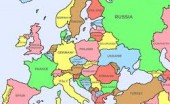Molly Minturn - My family is heartbroken to share that my father died in surgery on Monday, Feb. 10. It…
Jeff Rubin: Why Your World is About to Get a Whole Lot Smaller: Oil and the End of Globalization
Written by Diana Thebaud Nicholson // June 15, 2009 // Agriculture & Food, Economy, Oil & gas // 2 Comments
A peak at oil reserves
(The Economist) ACCORDING to BP, an oil company, the world has enough oil reserves to meet demand for the next four decades or so. (Interactive chart)
14 June
Warming up to carbon tax
Tariffs are good for the economy and environment, writes Jeff Rubin in Why Your World Is About to Get a Whole Lot Smaller. 
Here is an excerpt:
Efforts in the developed world to restrict and replace coal-fired capacity seem downright quixotic when juxtaposed against China’s (and other developing countries’) coal-expansion plans. Whatever reduction in greenhouse gas emissions is achieved in the world’s developed economies from switching away from coal will simply be overwhelmed by the increase in emissions from new coal-fired plants in China and the rest of the developing world.
Saving the world is a noble motive for going green. But there is another compelling reason to want a carbon-abatement regime in place as soon as possible. It is called good old-fashioned naked economic self-interest. If we can’t agree to save the world for someone else’s benefit, we might as well do it for our own.
12 June
Peak Oil: Good Things Could Happen to Us
(Canada.com) In Rubin’s assessment, the high price of oil will lead to exorbitant transportation costs that will obliterate Asia’s huge economic advantage on labour and production. Export economies such as Canada’s will also be disadvantaged. But the loss of long distance trade will be compensated by a dramatic rise in local manufacturing and travel — no more inexpensive flights to Mexico, Europe and Asia. We will return “to the bygone years of our fond memory where people work and vacation nearer to home, eat locally grown foods and buy locally produced goods, and suburban sprawl is replaced by revitalized cities” (Globe & Mail, May 29/09). Agricultural land presently occupied by suburbia will revert to farms, and massive expenditures on public transportation will make cities more efficient and liveable.
In Rubin’s assessment, this need not be a time of deprivation and hardship. The world will become smaller and more intimate as centres of production shift to locations closer to consumers. Employment and prosperity will be more amenable to local control. We will become more familiar with nearby attractions, entertainment and recreational places such as parks. Native wildlife and provincial wilderness areas will assume new value as our attention shifts from the exotic and distant to the familiar and close. Indeed, peak oil may be one of the best things that could happen to us.
6 June
Why Your World is About to Get a Whole Lot Smaller (Financial Times review)
This is a book about the implications of Peak Oil: the theory that the world’s oil production is past the highest level it will ever reach, or very close to it.
Merely by writing that sentence, I have ensured a healthy crop of angry correspondence for the FT. Believers in Peak Oil are quick and often intemperate in defence of their views. Their zeal is understandable. If you had uncovered a truth that would mean the end of civilisation as we know it, but were being universally ignored, you too might seem a little wild-eyed. Yet that intensity often makes it hard for the Peak Oilists to get their message across.
Yet for all their crankiness, the Peak Oilists are on to something. Energy supplies of all kinds, and oil in particular, are becoming increasingly problematic. And there is a profound public complacency about the extent to which our economies are dependent on reliable supplies of cheap energy – supplies that are becoming ever more difficult to guarantee.
For financially literate FT readers, the Peak Oilists’ credibility is further undermined by their suspicion of market forces. “Economist” tends to be a term of abuse in Peak Oil circles. That is why Jeff Rubin’s book is so welcome. As former chief economist at investment bank CIBC World Markets, he brings a perspective to the debate that is original, engaging and persuasive. Won over by Colin Campbell, a geologist who was one of the founders of the Association for the Study of Peak Oil, Rubin has become a convert to the belief that we are heading for an era of energy scarcity. Yet his assessment of the implications of that historic shift, while sobering, is ultimately reassuring.
The world economy will change profoundly and the transition may be painful. But, he argues, the new world could be “a lot more livable and enoyable than the one we are about to leave behind”.
3 June
Globe & Mail review By Todd Hirsch, senior economist for ATB Financial, a full-service Alberta-based financial institution, writer for the Calgary Herald and The Globe and Mail, and professor of economics at the University of Calgary.
Is there life after serving as one of Canada’s most well-known and controversial bank economists? Jeff Rubin is going to find out.
The former CIBC World Markets guru made quite a name for himself over the years with his wild predictions and out-on-a-limb forecasts; some of them actually proved accurate. And now he’s spinning that notoriety into a new career in the book-and-speaker-tour industry. Already highly in demand as a conference speaker, Rubin is about to get a whole lot busier (and burning a lot more jet fuel in the process).
His new book, Why Your World is About to Get a Whole Lot Smaller: Oil and the End of Globalization , presents a compelling argument that our entire global economy has been propped up by seemingly endless supplies of cheap oil. But take heed: The day of reckoning is nigh. Rubin sets up the book with some blushing accolades for his forecasting prowess, mentions of his appearances on CNN and in The Wall Street Journal, and stories of how he told an audience of skeptical Calgary oilmen in 2000 that oil was going to burst through $100 a barrel. But once you get past the bit of self-congratulating in the introduction, the book is a great read, and one that should be required for anyone with a long-term interest in Canadian energy, transportation, manufacturing or agriculture.
The book is clearly written for the U.S. market (notable through words such as “check” instead of “cheque” and pricing gasoline in dollars per gallon). Yet other countries, such as Australia, Britain, New Zealand and yes, Canada, too, are featured prominently in his examples. And while Rubin may be fishing for U.S. sales and speaking engagements, he mercifully doesn’t masquerade as an American. Dozens of times, he mentions examples and statistics from Ontario, and clearly refers to Toronto as his home.
For an economist, Rubin has an unusually engaging writing style. The book is chock full of numbers and statistics, but he has woven them into very readable prose. He also uses imagery and allegory to good effect, such as the reference to playing table tennis on a moving train: The ball may appear to be bouncing back and forth, but in the grand scheme it’s really moving only in one direction. That image describes beautifully what happens with oil prices – rising and falling from time to time, but really on an unstoppable upward trend.
The book’s more valuable contribution is in the description of how the depletion of cheap energy will make our world smaller
The case is made that the global economy, which has been propelled over the 20th century by cheap oil, is about to get a nasty slap in the face. The day of cheap oil is over. We are drilling through thousands of metres of sea water and bedrock to get at the stuff, and boiling it out of the frozen, mucky sand of northern Alberta. The effort has signs of desperation written all over it.
And without cheap oil, globalization doesn’t work.
Ah, but what about technology? We can find better ways to burn oil, invent more efficient vehicles and develop less costly ways to heat our homes. Technology will save us, won’t it? Not according to Rubin, who argues that all of the impressive gains in efficiency over the past 50 years have done nothing to reduce overall consumption. All they have done is to reduce the cost to consumers, thus encouraging even larger homes and vehicles.
Yet Rubin’s talk of peak oil and depleting supply isn’t really new. In some ways, most of this book has been written dozens of times already. No serious economist would deny the premise of “peak oil” or, at the very least, that “plateau oil” is upon us, save for the vested interests in the energy patch with share prices to protect.
The book’s more valuable contribution is in the description of how the depletion of cheap energy will make our world smaller. (Actually, I think he’s got the analogy wrong; rather than getting smaller, our world is about to get much, much bigger. China will seem much further away. Grapes imported all the way from Chile will be an extravagance. If globalization made the world smaller, costly oil is about to make it bigger once again. But this is a quibble.)
It’s unfortunate that Rubin reserves only the last 56 pages for a discussion of how the local economy is about to make a big comeback, since this is the more interesting and unique part of the book. Is there hope for North American manufacturing after all? Will local agricultural production reverse its downward trend? He argues that a locally based economy could be revived in an era of ever-rising energy prices, but it’s too bad he doesn’t play up a bit more the potential benefits of local versus global.
For example, while North American consumers have enjoyed lower prices on goods from China over the past few decades, are we really better off? Children’s toys are a good example. Anyone with children, nieces or nephews can attest to the fact that we’ve absolutely buried our kids in an avalanche of cheap toys. Most of us baby boomers or Gen Xers are still shackled with the mentality that more is better. But heaping more cheap (sometimes poisonous) toys on kids than they could possibly play with in one childhood is definitely not better.
Rubin is spot-on with his conclusion that we had better brace ourselves for some changes in the way we eat, the way we travel and the way we take for granted the ever-increasing abundance of inexpensive consumer goods. Using less energy will simply not be an option. And one gets the impression he actually believes that our society will be better off for it. But it would have been nice to hear that case made more forcefully and optimistically from this not-so-dismal economist.
We can always rely on the National Post to be contrarian and once again, they do not disappoint. Thus, we cannot resist pointing to the headline in the 11 June edition World oil reserves edge down: First drop in decade
Peter Foster: Stop the world, Jeff wants to get off
… Mr. Rubin has … departed from CIBC. This, he claims, is significantly due to his new book: Why Your World Is About To Get a Whole Lot Smaller. It’s easy to see why the bank wouldn’t like it. But that’s likely not because it’s too boldly insightful, as Mr. Rubin might believe. It’s because Mr. Rubin has gone from the dismal science to the Dark Side.
The former CIBC star is both a fine writer and an engaging speaker, but he has contracted a bad case of Peak Oil Theory, a condition that afflicts those inclined to anti-materialism, Big Oil paranoia and Pollyanna-ish belief in policy wisdom (But then Mr. Rubin is actually in favour of carbon tariffs, which would collapse world trade faster than you could say Smoot-Hawley).
… Mr. Rubin claims to foresee the end of life as we know it, and asserts that “It is hard to say which possibility is more alarming to economists — that the world has reached its peak oil production plateau, or that the rules of their vocation don’t seem to be working any more.”
But Peak Oil is essentially a primitive, static theory based on treating the entire energy economy as if it were a single, depleting oil well, underplaying innovation and failing to grasp — or refuting– the role of market pricing because, as Mr. Rubin claims, economics only tells “half the story.” To argue with a Peakster, meanwhile, is to be cast as someone who “just doesn’t want to believe.”
Mr. Rubin’s take is, like that of most peaksters, profoundly moralistic. Anybody who writes about “the 18-wheeler of globalization” being thrown into reverse is clearly no great fan of world trade. Expensive oil will mean “a severe curb on the free-spending lifestyle.” But then he suggests that that life “wasn’t particularly great to start with,” since “Smog-congested cities, global warming, oil slicks and other forms of environmental degradation are all part of the legacy of cheap oil.”




2 Comments on "Jeff Rubin: Why Your World is About to Get a Whole Lot Smaller: Oil and the End of Globalization"
The race will be between the end of cheap oil and the end of globalization in it’s own right.
Oil is just one part of globalization. Equally as significant is unemployment of youth. As is wealth generation with manufacturing. Information technology and financial services are not wealth creation engines. They are only facilitators of making things to sell.
The biggest factor may turn out to be demographics. The world population is mono-polar right now. Mostly young – under 25. With declining birth rates it portends a mid century population crash that will open up land and markets like the plague did in Europe. That will generate wealth by reducing demand and localizing economics also.
The end of globalization will be very good for people and the planet.
2008 world oil consumption: 85 million barrels of oil per day
42 gallons equals one oil barrel
55 gallon steel drum: 22??? wide by 3??? tall
A mile is 5,280 feet long
Circumference of the earth is 24,901 miles
Speed of sound 768 mph
Take the 85,000,000 bbl of oil & times it by 42 gal in a barrel to equal 3,570,000,000 total gallons of oil used everyday.
Divide these total gallons by steel drums
3,570,000,000gal / 55 gal steel drum = 64,909,090 drums of oil consumed each day.
at 3 feet tall it takes 1,760 drums laid end-to-end to build a pipeline one mile long: 5280???/3??? = 1,760 drums
Daily consumption of oil in drums divided by the number of drums in a mile:
64,909,090 drums/1,760 drums in a mile = a 36,880 mile long pipeline worth of drums laid end to end being consumed every day
Circumference of the earth is 24,901 miles
At 85,000,000 barrels per day, in one year???s worth of consumption enough oil drums could be filled to make the trip around the world 540 times: (36,880 miles * 365days)/24,901 = 540
36,880 miles / 24 hours in a day = 1,537 miles every drum would need to travel each hour to cover the 36,880 mile distance in a 24 hour period.
1,537 miles / 768 mph speed of sound = 2 or twice the speed of sound.
To sum: at 85,000,000 barrels worth of daily consumption you could build an oil pipeline using steel drums 36,880 miles long (or approximately 1.5 times the circumference of the earth), and since you???d be replacing this pipeline???s volume every day the crude oil flowing through it would be traveling at twice the speed of sound! And in one year’s worth of production you would use enough drums to encircle the earth 540 times.
Now, who in their right mind believes just half that amount will be replaced using bio fuels?
The US uses 20 million barrels per day but only 5.1 million is produced domestically. The US roadway fleet uses 10 million of that 20 million. IOW, all other things remain the same, Obama and D.C. could outlaw all roadway transportation – motorcycles, cars, trucks, and SUVs – and close every gas station they’d eliminate 10 million out of the 20 million barrels of daily consumption. BUT at only 5.1 million barrels being produced domestically the US would still have to import 5 million barrels per day…or half its oil consumption.